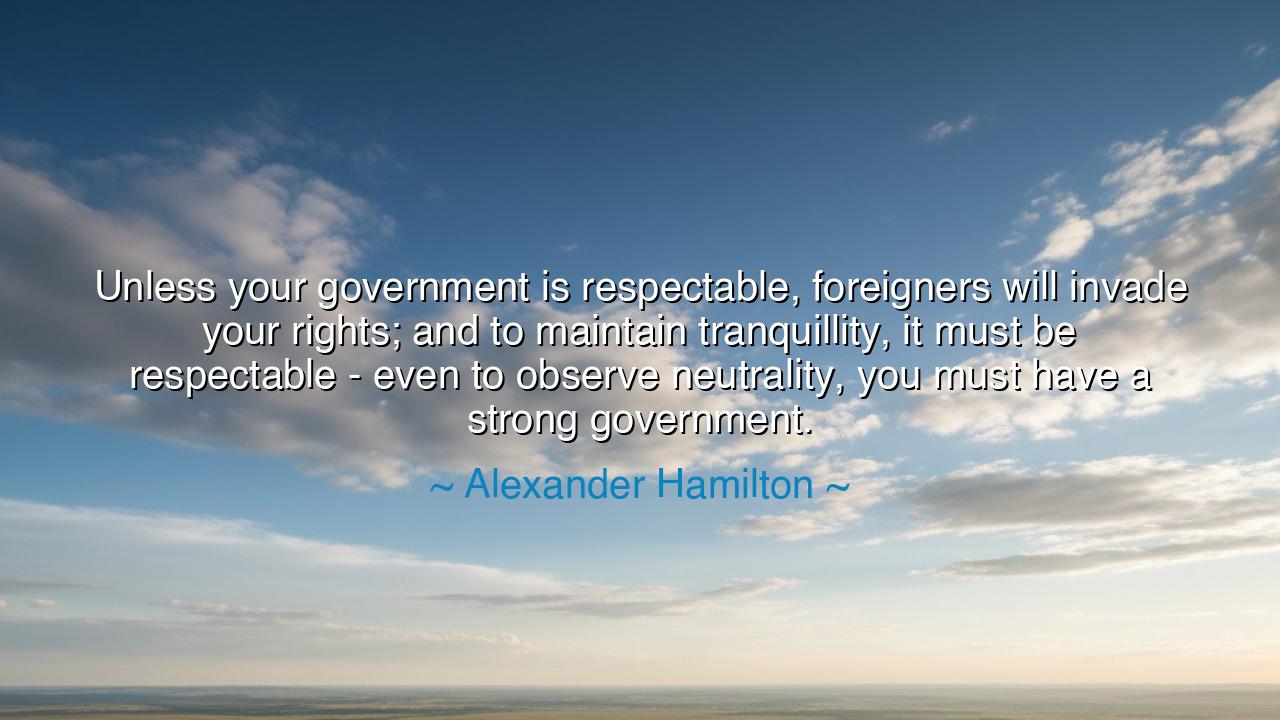
Unless your government is respectable, foreigners will invade
Unless your government is respectable, foreigners will invade your rights; and to maintain tranquillity, it must be respectable - even to observe neutrality, you must have a strong government.






When Alexander Hamilton declared, “Unless your government is respectable, foreigners will invade your rights; and to maintain tranquillity, it must be respectable — even to observe neutrality, you must have a strong government,” he spoke as both a realist and a visionary. These words, carved from the struggles of a young and fragile republic, reveal Hamilton’s deep understanding of power, order, and the nature of nations. He knew that weakness invites insult, and disorder invites invasion. In this declaration, he warns that a nation’s dignity and independence rest not merely on ideals, but on its capacity to defend them.
The origin of this quote can be traced to the turbulent years following the American Revolution, when the fledgling United States stood vulnerable before the great empires of Europe. The Revolution had won independence, but not yet respect. The nation was bound by the feeble Articles of Confederation, a system too weak to enforce its own laws or protect its borders. Hamilton, seeing the chaos and disunity that plagued the states, feared that without a strong and “respectable” central government, the dream of liberty would crumble into anarchy. His words were born of experience — of watching foreign powers, particularly Britain and Spain, exploit America’s disorganization and weakness.
Hamilton’s meaning runs deeper than mere military preparedness. To him, a respectable government was not one of arrogance or aggression, but one that commanded order, justice, and consistency — qualities that made other nations cautious, and citizens confident. He believed that strength and virtue were inseparable; that a government that could not command respect abroad would soon lose respect at home. In his view, a disordered republic invites not only foreign interference but also internal decay, for when authority becomes fragile, the people lose faith in its legitimacy, and chaos becomes the tyrant.
History vindicated his wisdom. When the War of 1812 broke out, the young United States found itself again tested by foreign insult — its sailors seized, its capital burned, its sovereignty mocked. The conflict revealed both the peril of division and the power of unity. Only through endurance, organization, and reform did the nation survive, emerging stronger and more cohesive. Later, under leaders who embodied Hamilton’s vision — men like Lincoln and Roosevelt — the United States learned the same lesson: that peace is not the reward of weakness, but the fruit of strength tempered by restraint.
Hamilton’s insight also speaks to the moral character of leadership. For “respectability” in government does not rest solely upon armies or treasuries, but upon integrity and principle. A corrupt government may wield power, but it cannot command honor — and without honor, even strength becomes brittle. To be truly “respectable” in the eyes of the world, a nation must practice the virtues it proclaims: justice, responsibility, and unity. In this sense, Hamilton’s message is both patriotic and philosophical — a call to build not merely a powerful state, but a noble one, whose might is matched by moral purpose.
We see his wisdom reflected again and again in the tapestry of history. When the Roman Republic became consumed by internal strife, its enemies found little resistance at its borders. When Weimar Germany faltered in weakness and division, tyranny rose to fill the void. In every age, Hamilton’s warning holds true: a nation that cannot govern itself will soon be governed by others. To observe neutrality, to maintain peace, to stand sovereign in a world of competing powers — all these require a government that commands respect through competence, unity, and resolve.
The lesson is clear and eternal: liberty without order is vulnerability; independence without strength is illusion. A free people must not despise the structures that preserve their freedom, nor forget that the respect of nations is earned, not granted. Each generation must fortify its institutions, defend its values, and cultivate leaders of courage and integrity. For as Hamilton taught, the world does not honor the weak, nor wait for the divided to rise.
So let this teaching be carried forward: a nation’s dignity is the mirror of its government’s strength, and its peace depends on the virtue of its people. If a people wish to remain free, they must build governments that deserve respect — wise in policy, just in principle, and unyielding in the face of both foreign menace and internal decay. Only then can they stand among nations not as supplicants, but as equals, their tranquility guarded not by fortune, but by their own strength and honor.






AAdministratorAdministrator
Welcome, honored guests. Please leave a comment, we will respond soon